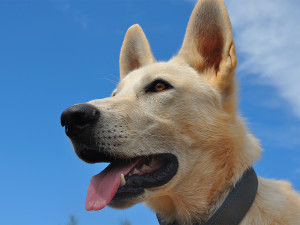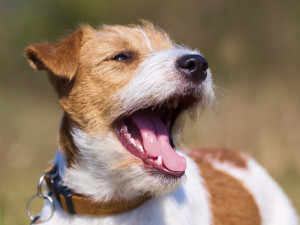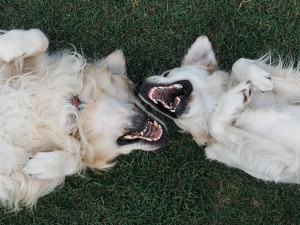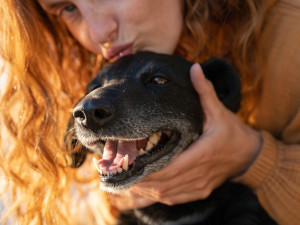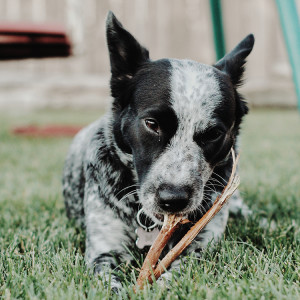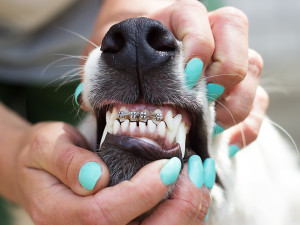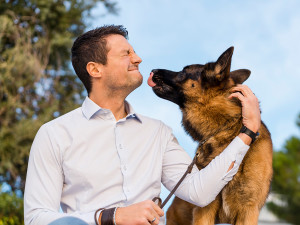Can Puppies Lose Their Teeth? Baby Teeth In Puppies
Whether you should save them for the tooth fairy is another issue entirely.
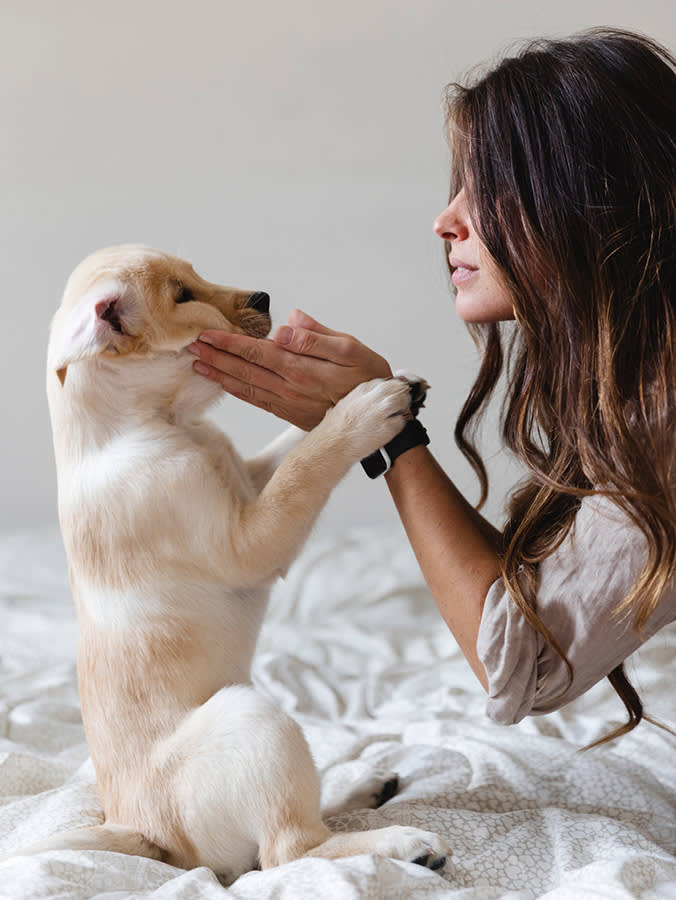
share article

Your pet wants you to read our newsletter. (Then give them a treat.)
In This Article:
When Do Puppies Lose Their Baby Teeth? opens in a new tabDo Puppies Swallow Their Baby Teeth?opens in a new tab Signs of Puppy Teething opens in a new tabPuppy Teething Timelineopens in a new tab Promoting Healthy Adult Teethopens in a new tab Frequently Asked Questionsopens in a new tab
Just as human babies grow teeth that later fall out to make room for adult chompers, puppies develop a temporary set of teeth that start to shed around 12 to 16 weeks of age. During this teething stage, puppies may swallow the small baby teeth unnoticed.
When do puppies lose their baby teeth?
Over their lifetime, dogs will have two sets of teeth: 28 deciduous (baby) teeth and 42 adult teeth. While the exact timeline for growing and losing teeth varies from dog to dog, most dogs will start to get their first baby teeth around three to four weeks of age. A full set of deciduous (baby) teeth can be expected between six and eight weeks of age. Deciduous teeth tend to erupt in this order:
Canines
Incisors
Premolars
Puppies will start to lose their baby teeth when they’re about 12 weeks old and usually have all of their adult teeth by five to seven months of age. Adult dog teeth tend to come in this order:
Incisors
Canines
Premolars
Molars
Do puppies swallow their baby teeth?
Puppies swallowing their baby teeth is very common and very normal. Most puppy parents don’t witness their puppy losing a single baby tooth. Some puppy parents may find a stray baby tooth on the floor or a small spot of blood on a teething toy. But more often than not, puppies will swallow their baby teeth and their people are none the wiser.
Is swallowing baby teeth bad for a puppy?
Puppies swallow most (and sometimes all) of their baby teeth without any issues. Swallowing baby teeth will not make puppies sick. If you're worried your puppy is sick due to signs like pain, decreased appetite, or vomitingopens in a new tab, forget about their baby teeth and contact your vet
Signs of Puppy Teething
A puppy’s baby teeth are much more sharp than their adult teeth, so puppies can do a lot of damage while teething. The entire teething process — from the first canine tooth to the last adult molar — can last between seven and eight months.
Those seven months can be a whirlwind for new puppy parents as their pups are busy exploring the world with their mouths. Puppies exhibit excessive chewing for a variety of reasons, including teething, playfulness, curiosity, and boredom. Signs that a puppy is teething include:
Excessive chewing
Red and inflamed gums
Drooling
Slow, careful chewing
Missing teeth
Lethargy
Puppy teething timeline
A puppy’s mouth will go through a lot of changes during the first year of life. Puppies go from being completely toothless to growing sharp baby teeth, to replacing those teeth with their forever teeth. Here’s a general timeline of development:
Incisors
Incisors are the tiny teeth at the front of a dog’s jaw. They are used for nibbling, grasping, and grooming.
Baby incisors erupt: four to six weeks
Baby incisors fall out: 12 to 16 weeks
Adult incisors erupt: four to five months
Canines
Canines are the sharp, pointed teeth located next to the incisors. They are used for tearing and holding onto objects.
Baby canines erupt: three to four weeks
Baby canines fall out: four to five months
Adult canine erupt: five to six months
Premolars
Premolars are located behind the canine teeth. They have flatter surfaces and are used for shearing and tearing.
Baby premolars erupt: four to six weeks
Baby premolars fall out: six months
Adult premolars erupt: four to seven months
Molars
Molars are the large, flat teeth located at the back of a dog’s jaw. They are used for crushing and grinding.
Molars aren’t part of puppy dentition, so there are no baby molars.
Adult molars erupt: four to seven months
Possible puppy dental issues
Parental involvement in the teething process should be minimal. Puppy parents should focus on providing plenty of toys for pups to chew on and use positive reinforcementopens in a new tab to steer them toward those toys and away from your shoes. Even though baby teeth don’t stay around for long, they can have issues. These puppy teeth problems often require veterinary attention:
Broken deciduous teeth
Some people’s first thought if a puppy cracks a tooth may be, Well, it’s gonna fall out anyway, but this is the wrong approach. Puppy tooth roots are longer, so a cracked baby tooth is more likely to result in an exposed tooth root. This can leave a puppy susceptible to infection and a world of pain. If a puppy breaks a tooth, a veterinarian may recommend dental X-rays to determine the extent of the damage.
Delayed eruption of deciduous teeth
While most puppies grow their baby teeth like clockwork, sometimes a tooth might be a bit late to the party. This delay can occur due to dense tissue covering the tooth, blocking the tooth’s eruption. Delayed eruption of baby teeth can result in abnormal gingiva (where the tooth is trying to come up) or cyst formation. Delayed tooth eruption is more common in small-breedopens in a new tab dogs.
Retained deciduous teeth
A puppy may get all their baby teeth without any issues, but occasionally, some of those suckers don’t want to leave. Baby teeth that don’t fall out on schedule create a crowded environment for the adult teeth trying to come in. This can lead to bad positioning of the adult teeth and misalignment of the jaw.
How to promote healthy adult teeth
Dogs rely on their teeth for eating, grooming, playing, and exploring, so dental health is important. Neglecting dental care in dogsopens in a new tab can lead to infection, discomfort, and pain. Pet parents should be proactive and take steps to keep their dog’s chompers healthy.
Check your dog’s teeth regularly: Getting puppies used to certain sensations, like having their ears touched, paws held, and mouth opened, will make veterinary visits and at-home care easier. Introduce your puppy to the idea of having their teeth inspected early.
Regular toothbrushing: Use a dog-specific toothbrush and toothpasteopens in a new tab to brush your dog’s teeth regularly. Daily is ideal, but a few times a week can make a huge difference.
Routine vet visits: Schedule regular checkupsopens in a new tab with your vet. Your vet can assess your dog’s oral health and recommend interventions before dental disease becomes severe.
Professional dental cleanings: Thorough dental cleanings are performed under general anesthesia and can help remove the plaque and tartar that accumulate over time. This is also the time for problem teeth to be removed.
Proper chew toys: Both teething puppies and adult dogs need proper chew toysopens in a new tab. Dogs that like to chew on tough objects are at risk for wearing their teeth down or suffering from cracked teeth.
Healthy diet: Growing puppies need extra nutrients to grow strong bones and teeth. Be sure to feed an age-appropriate diet for each of your dog’s life stages.
FAQs (People also ask):
How do I know if my puppy has gum disease?
Gingivitis develops when bacteria opens in a new tabcause inflammation along the gumline. Dogs start to accumulate tartar once they’re one year old. Signs of gum disease in dogs include bad breath, discolored teeth, inflamed gums, and pain when chewing.
Do puppies have pain when losing teeth?
Teething can cause puppies occasional discomfort. Signs of pain associated with teething in puppies include slow/deliberate chewing, drooling, whining, and lethargy. If a pup is in too much pain to eat, contact a vet to see if something else is going on.
How do I take care of my puppy’s teeth?
Parents can help their teething puppies by providing appropriate teething toys. Puppy parents can also get their pups used to dental care by introducing toothbrushing early.
References:

Dr. Alycia Washington, DVM, MS
Alycia Washington, DVM, is a small animal emergency veterinarian based in North Carolina. She works as a relief veterinarianopens in a new tab and provides services to numerous emergency and specialty hospitals. Dr. Washington is also a children’s book author and freelance writer with a focus on veterinary medicine. She has a special fondness for turtles, honey bees, and penguins — none of which she treats. In her free time, Dr. Washington enjoys travel, good food, and good enough coffee.
Related articles
![a pair of English cream retriever dogs wiggle around on their backs with big grins on their faces]() opens in a new tab
opens in a new tab80% of Dogs Have a Dental Disease — Does Yours?
Here are four common dental problems your pup might face and how to treat them.
![Close up of red headed woman holding a black dog's face showing his teeth]() opens in a new tab
opens in a new tabThey’re Just Like Us: Dogs Get Gingivitis
Dogs can suffer from gum disease, too. Here’s how to prevent it.
![Dog in the grass outside chewing on a bully stick]() opens in a new tab
opens in a new tabChew on This: A Guide to Safe and Not-So-Safe Dog Bones
Two experts — a veterinary dentist and internist — rate the most popular dog bones.
![A person holding a dogs mouth open showing its braces.]() opens in a new tab
opens in a new tabWhy Dog Orthodontics Exist and Your Pup May Need Them
Braces are actually the most gentle way of dealing with your dog’s malocclusion (aka a “bad bite”).
![A man with his eyes closed while a dog attempts to lick his face for a kiss.]() opens in a new tab
opens in a new tabHere’s Why Your Dog’s Breath Is the Worst
It might be a sign of a bigger issue.
![Greenies Digestive Probiotic Supplement Powder for Dogs,]() opens in a new tab
opens in a new tabGreenies Launched a Digestive Supplement to Balance Your Pup’s Gut
The pet wellness company’s newest product aims to aid your pup’s tummy.
